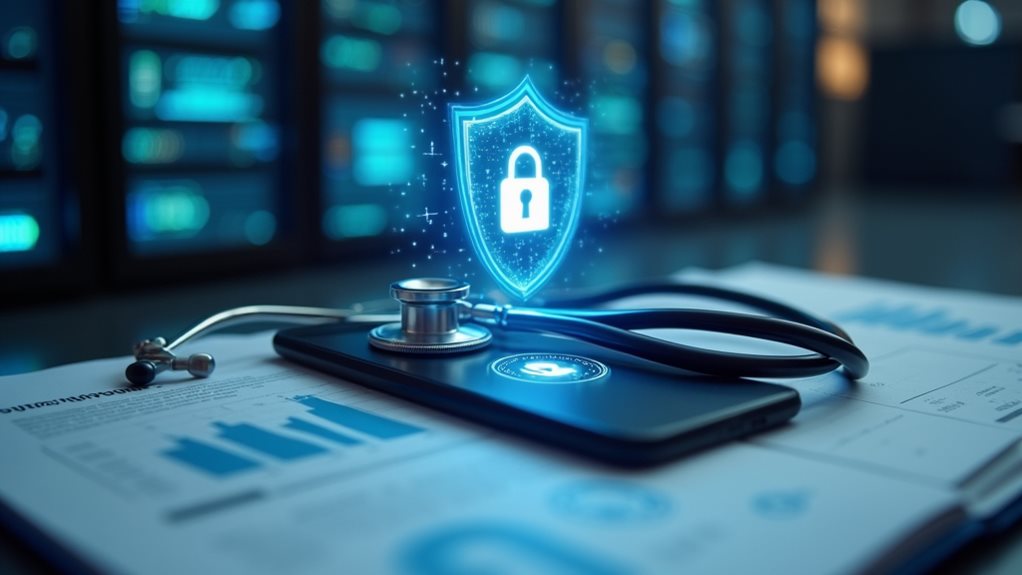Nextiva isn’t fully HIPAA compliant for healthcare organizations because they don’t provide Business Associate Agreements (BAAs), which you’re legally required to have when transmitting protected health information. While Nextiva offers end-to-end encryption, audit trails, and administrative controls, the absence of a BAA creates considerable compliance gaps that could expose your practice to regulatory penalties and legal risks. Understanding these limitations and exploring specialized healthcare communication alternatives will help you make an informed decision for your practice.
Understanding HIPAA Requirements for Healthcare Communications
When healthcare organizations handle patient information through digital communications, they must maneuver a complex web of federal regulations designed to protect sensitive data.
Healthcare organizations face intricate federal compliance requirements when transmitting patient data through digital communication channels.
You’re part of a community that understands the stakes—patient trust and legal compliance hang in the balance. HIPAA’s healthcare regulations establish strict boundaries around how you can transmit, store, and access protected health information through any communication platform.
These communication standards aren’t just bureaucratic hurdles; they’re your shield against costly breaches and violations. You need systems that encrypt data both in transit and at rest, provide audit trails, and offer administrative controls.
The regulations demand that you can prove who accessed what information and when. Your communication tools must support these requirements seamlessly, guaranteeing that patient confidentiality remains intact while you deliver quality care.
Without proper security measures in place, healthcare organizations risk exposing sensitive patient data to unauthorized access and potential breaches that can result in significant financial penalties and reputational damage.
Nextiva’s HIPAA Compliance Features and Capabilities
Healthcare organizations seeking robust HIPAA-compliant communication solutions will find Nextiva’s platform addresses these regulatory demands through an extensive suite of security features.
You’ll discover that Nextiva’s thorough approach includes end-to-end encryption for voice calls, video conferences, and messaging systems. The platform’s administrative controls allow you to manage user permissions, monitor communications, and maintain detailed audit trails required for compliance documentation.
Nextiva Integration capabilities extend across existing healthcare workflows, guaranteeing seamless connectivity with your current systems.
The Communication Tools portfolio encompasses secure messaging, encrypted file sharing, and protected voice communications. You’ll appreciate features like automatic call recording with secure storage, role-based access controls, and real-time monitoring dashboards.
These tools work together to create a unified communication environment where your team can collaborate confidently while maintaining patient privacy standards. The platform’s call routing capabilities ensure patient calls are directed to the appropriate healthcare professionals promptly, maintaining secure communication channels throughout the process.
Business Associate Agreement (BAA) Availability With Nextiva

Although Nextiva offers extensive communication solutions for various industries, the platform doesn’t provide Business Associate Agreements for healthcare organizations. This creates considerable legal considerations for medical practices seeking HIPAA-compliant communication tools.
Without a business associate agreement, you can’t establish the required legal framework that protects patient health information during transmission and storage.
Healthcare providers like you need this crucial document to guarantee compliance with federal regulations. A BAA defines responsibilities, outlines security measures, and establishes liability terms between your organization and technology vendors.
Since Nextiva doesn’t offer this vital agreement, you’ll face compliance gaps that could expose your practice to regulatory penalties and patient privacy breaches.
Consider alternative communication platforms that prioritize healthcare compliance requirements.
Data Encryption and Security Measures in Nextiva’s Platform
The security infrastructure that protects your communications on Nextiva’s platform falls short of healthcare industry requirements, particularly when handling sensitive patient information.
Nextiva’s security measures prove inadequate for healthcare organizations requiring HIPAA-compliant protection of sensitive patient communications and data.
While Nextiva implements standard encryption protocols for general business communications, these measures don’t meet the stringent standards healthcare organizations need for HIPAA compliance.
You’ll find that Nextiva’s security framework lacks the thorough safeguards required for protected health information.
Their encryption protocols, though adequate for typical business use, don’t provide the end-to-end protection healthcare data demands.
Additionally, the platform’s security audits don’t focus specifically on healthcare compliance requirements.
VoIP systems like Nextiva face significant vulnerabilities including call tampering and eavesdropping threats that can compromise communication integrity and lead to unauthorized access of sensitive patient conversations.
If you’re part of the healthcare community seeking reliable communication solutions, you’ll need more robust security measures than what Nextiva currently offers to guarantee your patient data remains properly protected.
Call Recording and Storage Protections for Patient Information

When managing patient communications through call recording features, Nextiva’s platform actually provides thorough protections that align with healthcare industry standards.
You’ll find that call security measures include encrypted storage protocols and access controls that restrict who can retrieve recorded conversations. The platform implements patient confidentiality safeguards through role-based permissions, guaranteeing only authorized healthcare team members can access sensitive audio files.
Your recorded calls receive end-to-end encryption during transmission and remain encrypted while stored on Nextiva’s servers. The system automatically logs access attempts, creating audit trails that help you maintain compliance documentation.
You can configure retention policies to automatically delete recordings after specified timeframes, reducing long-term storage risks. These extensive protections help your healthcare organization maintain patient trust while leveraging communication tools effectively.
The platform utilizes encryption protocols like TLS and SRTP to ensure data confidentiality and integrity against eavesdropping attempts on sensitive patient communications.
Access Controls and User Authentication Systems
You’ll need robust access controls to protect patient data, and Nextiva’s authentication systems provide the security foundation your healthcare organization requires.
The platform’s multi-factor authentication features create multiple security layers, guaranteeing only authorized personnel can access sensitive information even if passwords become compromised.
Additionally, you can implement role-based permission management to control exactly what each team member can see and do within the system, matching access levels to specific job responsibilities.
These access control mechanisms work alongside advanced encryption protocols to prevent unauthorized access attempts and maintain the integrity of your healthcare communications.
Multi-Factor Authentication Features
Although Nextiva doesn’t currently offer built-in multi-factor authentication (MFA) features, understanding how this security layer works remains crucial for healthcare organizations evaluating communication platforms.
Multi-factor authentication requires users to provide two or more verification methods before accessing systems, greatly strengthening security beyond simple passwords.
Without MFA, you’re relying solely on username-password combinations, which can be compromised through data breaches or social engineering attacks.
Healthcare organizations handling protected health information need robust user verification processes to meet HIPAA’s administrative safeguards requirements.
You’ll need to implement third-party MFA solutions or consider alternative communication platforms that include these features natively.
This gap in Nextiva’s security offerings represents a notable consideration for healthcare practices prioritizing thorough data protection and regulatory compliance.
VoIP systems without proper authentication measures become vulnerable to caller ID spoofing attacks, where hackers can manipulate trust to gain unauthorized access to sensitive communications.
Role-Based Permission Management
Role-based permission management forms the backbone of secure healthcare communication systems, yet Nextiva’s current offerings fall short in this critical area.
You’ll find that effective role management requires granular control over who can access what information, when they can access it, and how they can interact with sensitive data. Healthcare organizations need sophisticated user permissions that align with job functions, departmental responsibilities, and compliance requirements.
Unfortunately, Nextiva’s platform lacks the thorough role-based controls necessary for HIPAA compliance.
You won’t get the detailed permission hierarchies that allow administrators to restrict access based on patient relationships, treatment involvement, or administrative necessity. This limitation puts your organization at risk, as you can’t properly segment access to protected health information according to the minimum necessary standard that HIPAA demands.
Audit Trails and Monitoring for HIPAA Compliance

When healthcare organizations handle protected health information (PHI), maintaining thorough audit trails becomes a critical component of HIPAA compliance that can’t be overlooked.
You need extensive audit logging that captures every access, modification, and transmission of patient data within your communication systems.
Effective audit trails should document who accessed what information, when it occurred, and from which location. This detailed tracking enables you to identify potential security breaches quickly and demonstrate compliance during regulatory reviews.
Your audit logging system must retain records for at least six years, as required by HIPAA regulations.
During compliance audits, these detailed logs serve as your primary defense, proving you’ve maintained proper oversight of PHI handling.
Without robust monitoring capabilities, you’re fundamentally operating blind in today’s regulatory environment.
Healthcare organizations using VoIP systems must implement encryption protocols like TLS and SRTP to secure voice data transmission and protect patient communications from unauthorized interception.
Potential Risks and Limitations of Using Nextiva for Healthcare
While Nextiva offers HIPAA-compliant features, you’ll need to carefully consider several potential risks before implementing it in your healthcare practice.
Data security vulnerabilities can emerge if you don’t properly configure encryption settings, access controls, and user permissions across all communication channels.
You might also face compliance configuration challenges when setting up audit logs, managing business associate agreements, and guaranteeing that all team members understand the platform’s security protocols.
Healthcare organizations should also implement robust intrusion prevention systems to detect and block unauthorized access attempts that could compromise patient data transmitted through VoIP communications.
Data Security Vulnerabilities
Despite Nextiva’s extensive security measures and HIPAA compliance features, no communication platform is immune to potential vulnerabilities that healthcare organizations must carefully consider.
You’re part of a healthcare community that understands the critical importance of protecting patient information, and it’s crucial to acknowledge potential weak points in any system you’re evaluating.
Even with robust encryption and compliance certifications, you might face risks from third-party integrations, employee access mismanagement, or evolving cyber threats.
A data breach could occur through human error, social engineering attacks, or undiscovered system weaknesses.
That’s why you’ll want to conduct regular security audits and maintain vigilant monitoring practices.
Your organization’s due diligence doesn’t end with choosing a HIPAA-compliant provider—it requires ongoing assessment and proactive security measures.
VoIP systems face common threats including eavesdropping, call interception, and DoS attacks that can disrupt critical healthcare communications.
Compliance Configuration Challenges
Although Nextiva offers HIPAA compliance capabilities, configuring these features correctly presents considerable challenges that can leave your healthcare organization vulnerable to compliance violations.
You’ll face configuration hurdles that require technical expertise your team mightn’t possess, creating gaps in your security posture.
The compliance challenges extend beyond initial setup. You must continuously monitor and adjust settings as regulations evolve, which demands ongoing attention and resources.
Many healthcare organizations struggle with these complex requirements, inadvertently exposing themselves to penalties.
- Steering through intricate privacy settings that aren’t clearly labeled or explained
- Managing user permissions across multiple departments without creating security gaps
- Maintaining audit trails while guaranteeing system performance doesn’t suffer
Without proper configuration expertise, you’re fundamentally gambling with your organization’s compliance status and patient trust.
Healthcare organizations may find their VoIP systems difficult to scale appropriately when compliance requirements change, as adding or removing users while maintaining HIPAA standards requires careful coordination of communication resources and security protocols.
Alternative HIPAA-Compliant Communication Solutions for Medical Practices

The terrain of HIPAA-compliant communication tools extends far beyond traditional phone systems, offering medical practices numerous alternatives to meet their specific operational needs.
You’ll find telehealth platforms like Doxy.me and SimplePractice provide built-in encryption and business associate agreements, guaranteeing your patient consultations remain secure.
Secure messaging solutions such as TigerConnect and Spok offer healthcare-specific features that standard business communications can’t match.
Consider cloud-based phone systems designed specifically for healthcare, including RingCentral for Healthcare and 8×8 Healthcare.
These platforms understand your unique compliance requirements and build protection directly into their infrastructure.
You’re not limited to compromising between functionality and security.
Evaluate each solution’s encryption standards, data storage practices, and willingness to sign business associate agreements.
Your practice deserves communication tools that prioritize both patient privacy and operational efficiency.
Final Thoughts
You’ll find that Nextiva offers solid HIPAA compliance features, including BAAs, encryption, and audit trails. However, you must carefully evaluate your specific healthcare needs and implement proper safeguards. Don’t rely solely on the platform’s built-in protections—you’re responsible for training staff, managing access controls, and maintaining compliance protocols. Consider consulting with compliance experts and comparing alternative solutions to guarantee you’re making the best choice for your practice’s security requirements.

